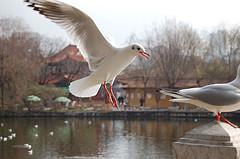| Jan 10, 2008 22:52 | |
 | Wow, thank you very much. This is very, very informative. I hope this thread will grow with more info. ^_^ |
| Jan 11, 2008 00:28 | |
 | I think the first half reflects what we do in most countries and is a fairly international 'safe list'. The warnings are useful and we should always try to remember these fine points, but I also believe these things can be exaggerated..... I feel it ie easy to overplay cultural differences. In China today, most people understand that the 'long noses' or 'white ghosts' (depending where you are) have slightly different customs, and are rarely offended if they don't know the Chinese norms. Generally, your hosts will be too courteous to be offended but as they get to know you they will start explaining. In fact, most will go out of their way to consider the foreigner's customs and habits (or what they have been taught are our habits!), even if they are totally puzzled by them! |
| Jan 17, 2008 18:31 | |
 | This is interesting. I am going to meet my gf's parents soon at Chinese New Year, so I am wondering what to take for them. I was thinking of some kind of whisky or spirit for her dad, and some kind of cakes or biscuits for her mum. Typically something from my home country, England, which should be new to them. So I must remember even numbers, but not 4, and avoid black and white combinations. Should be easy! Not long to go now, so excited! |
| Jan 17, 2008 20:19 | |
 | Red is a very auspiscious colour in China, and the number 8 is they luckiest of numbers. Depending on which part of the country you're in, receiving as a gift either a cat or a dog (more commonly a cat) is considered unlucky. If a cat is given as a gift then the recipient will typically offer a token sum of money in exchange - this way he or she is buying the cat, rather than being given it (thus averting bad luck). Wedding gifts ought always to be pairs of things, never single items. Jade is very precious in China, and gold remains ever popular (though younger Chinese prefer white gold to the more traditional variety). Around the Spring Festival, small orange trees seem remarkably popular, but oranges are always a popular gift when visiting someone's home. As the original poster mentioned, avoid pears. tigerpaul - right on the money with distinct, personal gifts from your home country. Chinese people love to receive things from overseas. If a Chinese person goes on a foreign holiday then they simply must bring back samples of the local food. Similarly, the gifts most highly prized from foreign friends are those from that person's home country that cannot be (easily) found in China. The trouble I found when shopping for typically British gifts in London was that just about everything seemed to have been made in China... Whisky is a safe bet. Spelled without an 'e', whisky is produced only in Scotland and will be highly valued in China (especially by the man of the house). Cakes and biscuits are trickier because Chinese tastes (especially amongst older Chinese people) are markedly different from western tastes. I know plenty of Chinese people who have been given tins of biscuits by visiting friends, have tried one or two, then just allowed the tin to gather dust. |
| Jan 20, 2008 20:58 | |
 | Quote: >>Contrary to Westerners, odd numbers are thought to be unfortunate.So wedding gifts and birthday gifts for the aged are always sent in pairs for the old saying goes that blessings come in pairs<< It is not always true that "odd numbers are thought to be unfortunate". 9 is also a lucky number in China. Especially, if you want to give some money to an elder in a family as a gift, do not give them some money with last digit of odd number. To make it more clearly, an example is more convincing. Give them 99 yuan instead of 100 yuan, since 9 has a similar tone of the chinese character ( 久jiu means forever or have a long life (longevity). When people get older, they are in fear of death and expect to live a long life. |
Post a Reply to: Gift giving in China









 Copyright © 1998-2026 All rights reserved.
Copyright © 1998-2026 All rights reserved.